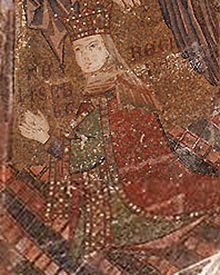Elizabeth of Carinthia, Queen of Sicily
Queen consort of Sicily / From Wikipedia, the free encyclopedia
Dear Wikiwand AI, let's keep it short by simply answering these key questions:
Can you list the top facts and stats about Elizabeth of Carinthia, Queen of Sicily?
Summarize this article for a 10 year old
Elizabeth of Carinthia (1298–1352) was Queen of Sicily by marriage to Peter II of Sicily. She was the regent of Sicily during the minority of her son Louis, King of Sicily from 1348 until her death in 1352.
| Elizabeth of Carinthia | |
|---|---|
 | |
| Queen consort of Sicily | |
| Tenure | 25 June 1337 – 15 August 1342 |
| Born | 1298 |
| Died | 1352 (aged 53–54) |
| Spouse | |
| Issue | |
| House | Gorizia |
| Father | Otto III of Carinthia |
| Mother | Euphemia of Silesia-Liegnitz |
The daughter of Otto, the penultimate duke of Carinthia and lord of Carniola from the House of Gorizia, she married Peter II of Sicily in 1323 and became the Queen of Sicily. During her time as Queen, Elizabeth ensured that the royal lineage of the Aragonese in Sicily continued. Two sons eventually ascended the throne, Louis of Sicily and Frederick IV of Sicily. Elizabeth was the regent for her young son Louis from 1348 until her death in 1352.
Politically, the decades leading up to Elizabeth's reign were full of conflicts between Frederick III, King of Sicily, and Robert of Naples who had the backing of the papacy in Avignon. Famine, warfare and plague were widespread in Europe during the mid-fourteenth century, which had a devastating impact on Sicily in particular, due to its economic expansion and prosperity in the two centuries prior. Elizabeth's reign occurred during a period where Italian citizens were disheartened and anxious, which caused tension among the local populace. The island was also marked by turbulent relations between the throne and Sicily's noble families, eventually degenerating into a civil war. These internal rivalries between the noble families required the coming of age of Elizabeth's sons to resolve the fighting.
Oops something went wrong: